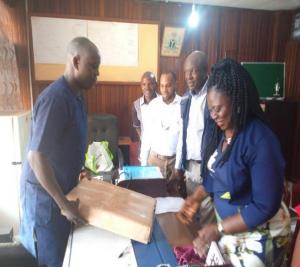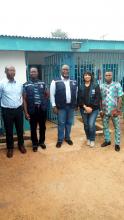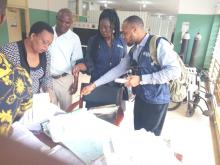WHO remains mobilized against Lassa fever cases as number of cases go down in affected areas
Abuja, 04 March 2019 – While the number of new Lassa fever cases have significantly reduced over the past weeks, intensified response activities are on-going to control the outbreak across Nigeria. To fully contain the outbreak, the World Health Organization (WHO) remains mobilized and is supporting Nigeria to stem further spread of the disease.
“As an influential leader of Etsako East, one of the worse hit areas, I am impressed with the continued sensitization and follow up visits by WHO personnel to ensure that our people are not infected”, says Mr John Onyene of Edo State.
According to him, through the sensitization activities, communities are encouraged to remain vigilant and report any rumour to the nearest health facility because early diagnosis and treatment can save lives.
Over the past weeks, the Nigeria Centre for Disease Control (NCDC) reported a decrease in the number of new Lassa fever cases in Nigeria. In the week 18-24 February 2019, twenty-three new confirmed cases were reported from eight States compared with up to 80 new cases reported between 21-27 January 2019. In total, 381 confirmed cases and 81 deaths have been reported between 01 January and 24 February 2019 from 21 States across 66 Local Government Areas(LGA)
Notwithstanding the overall decrease, available records indicate that several States have reported more cases in 2019 than in previous outbreaks. As at 24 February, Bauchi, Gombe and Taraba have notably reported more cases (29, 24 and 03 cases respectively) than in 2018 during the worst Lassa fever outbreak to date. WHO continues to help affected states by strengthening their capacity to conduct disease surveillance, treat patients, implement infection prevention and control measures, laboratory diagnostics and engaging with communities.
Speaking on the reduction in new cases, Dr Clement Peter, the WHO Officer-in-Charge (OiC) for Nigeria said “We welcome this recent evolution of the outbreak and the decrease in the number of new cases reported. However, this is no time to lower our guards. We must remain resolute and continue our intensified response to the current outbreak,”.
The OiC added that “WHO is committed to maintain its efforts to assist Nigeria in stopping this outbreak.”
The support to contain Lassa fever was closely coordinated with the NCDC as well as Federal and States’ authorities. On 15 February 2019, WHO participated in a review meeting convened by the NCDC to assess ongoing activities, identify and discuss lessons learned and improve the response to the outbreak.
In line with the recommendations after the meeting, WHO experts participated in a technical support visit to Ondo States, one of the affected states to review and assist with the establishment of a mobile laboratory to support the investigation. WHO also participated in similar advocacy field visits to other affected States such as Plateau with the NCDC to review the situation and raise awareness in the affected communities.
Furthermore, WHO Expanded Programme on Immunization teams in affected states worked with competent authorities in investigating and responding to the outbreak. In Enugu State, WHO assisted with Lassa fever contact identification, line listing, provided technical support to the Rapid Response Teams deployed to investigate the outbreak, provided medical supplies and equipment. To coordinate this support, WHO activated its Emergency Operation Centre bringing national and international experts to monitor the situation and manage response activities.
“Our response to the outbreak illustrates WHO’s strengthened capacity to actively support countries to better protect their population against health emergencies and outbreaks. The combination of WHO’s presence across the country, strong health emergency capacity and good cooperation with the NCDC and other Federal and State authorities provide WHO with a unique position to help Nigeria,” said Dr Peter.
Following the declaration of an outbreak on 21 January 2019 by the NCDC, WHO further scaled up its response mobilizing human and financial resources to assist Nigeria in stopping the spread of the outbreak. WHO mobilized US$ 400,000 to support response activities and deployed experts to Nigeria and affected States to assist with coordination, active surveillance, case management, laboratory investigation, provision of supplies and research.





